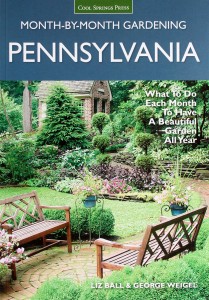12 Ways to Keep from Hurting Yourself in the Garden
A lot of people hurt themselves gardening.
Much can go wrong out there, from pruning your finger instead of the branch to straining your back from picking up a pot that you knew was way too heavy.
I hate to be naggy, but I’d also like to see fewer gardeners hurt themselves. So in that spirit, here are 12 gardener-safety precautions to consider:
1.) Use the right tools for the right job in the way the instructions say. Yeah, those safety warnings are boring, long, and written with lawyer input, but they’re there for one main reason – to keep you from hurting yourself (and others).
2.) Sharpen the tools. It’s amazing how much better sharp pruners and sharp shovels work. Less force to get the job done is much easier on your body parts, too.
3.) Stretch and work up to full speed gradually. A great way to hurt yourself is to go out cold and do a vigorous job right off the bat, like move a heavy pot or dig out a big shrub.
4.) Know your limits. If you’re getting tired and/or sore, injuries and accidents become more likely. It’s OK if the whole to-do list doesn’t get checked off today. Your lanky lilac limbs will forgive you. Also don’t try to pick up or carry things you know are too heavy for you.
5.) Wear gloves. They protect you from cuts and keep hands from chapping and cracking in cold weather. Get a tetanus shot at least every 10 years anyway.
6.) Mix up the jobs. Instead of doing the same motion over and over and over again for hours, protect your joints by doing a little digging, then a little raking, then a little pruning, then going back to finish the digging.
7.) Legendary USDA tree expert Alex Shigo once said the world’s most dangerous combination is a homeowner, a chain saw, and a ladder. Be really, really careful if you’re going up anywhere with any kind of cutting implements… or better yet, hire a trained, insured, safety-secured pro to do the high stuff.
8.) Wear ear protection if you’re using noisy power equipment like tillers, chippers, and gas trimmers and blowers. Once you end up with ringing in the ears or hearing loss, it’s too late.
9.) Wear eye protection whenever blowing things around, such as power-edging, chipping, leaf-blowing, and weed-whacking. Also protect your eyes against possible drift if you’re spraying pesticides. And watch that you don’t bend over and poke your eye on a knee-high garden stake (one of the under-rated of gardening injuries).
10.) Use insect repellent to guard against ticks, mosquitos, black flies, and other biting/pesky bugs. Covering up helps, too. Check carefully for ticks anyway after every gardening outing. You really don’t want to get Lyme disease.
11.) Cover up when outside in the sun as much as is practical to guard against sunburn and skin cancer. Wide-brimmed hats protect ears and necks. Use sunscreen on exposed skin.
12.) Be nice to your body. Drink plenty to stay hydrated. Don’t overdo it in hot weather to the point of risking heat exhaustion or heat stroke. And listen if your body is trying to tell you something, such as getting dizzy or light-headed (a possible sign of low blood sugar) or getting short of breath (an aggravation of possible heart or lung issues).









